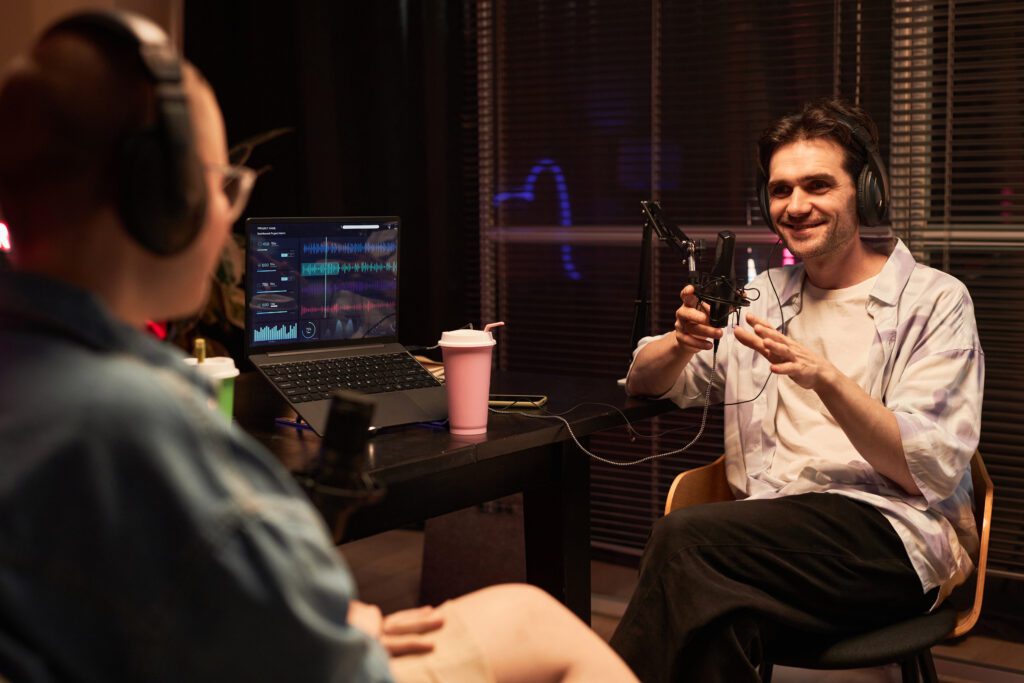Imagine a world where an algorithm knows what podcast you’ll love before you even think about it, where every episode is edited to perfection in minutes, and where every recommendation feels like it’s been plucked straight from your subconscious. That future isn’t on the horizon—it’s already here. But as AI continues to infiltrate every aspect of podcasting, one question looms large: Is this the innovation we’ve been waiting for, or are we losing something essential in the process?

In a recent episode of “I Hear Things,” Tom Webster discusses how AI tools like Descript and Auphonic are revolutionizing podcast production, making it easier than ever to produce polished, high-quality audio. But here’s the critical question: In our rush to embrace AI, are we trading efficiency for the craftsmanship that makes podcasting so uniquely human?
Consider This: Editing isn’t just about cutting out “ums” and “ahs”; it’s where storytelling comes alive. It’s the delicate process of shaping raw audio into a compelling narrative, creating intentional silences that allow an idea to linger or amplifying emotion through subtle pacing. When AI takes over, does your podcast still have your fingerprint, or is it becoming just another piece of algorithm-driven content?
Case Study – The AI-Enhanced Podcast: Take “The Storyteller’s Workshop,” a show that began as a labor of love. The host, Jenny, used AI tools to streamline her editing process, cutting her production time in half. At first, she was thrilled—her episodes sounded clean, and she had more time for interviews. But soon, something shifted. Longtime listeners started to notice the change. “It doesn’t feel like you anymore,” one wrote. “Your stories used to breathe, but now they feel... automated.” This wasn’t just a technical adjustment—it was a shift in the show’s essence. Jenny eventually scaled back her AI usage, finding a balance where technology enhanced her work without erasing her voice.
Key Insight: AI can reduce production time by up to 60%, but what’s the cost of that efficiency? For many podcasters, the trade-off is a loss of the unique touch that made their show special in the first place.

One of the most exciting aspects of AI’s integration into podcasting is its role in content discovery. Webster highlights how algorithms analyze listener behavior to suggest shows tailored to individual preferences, seemingly making it easier for podcasts to find their audience. But there’s a darker side to this hyper-targeted approach.
Ask Yourself: If AI keeps feeding us more of what we already like, are we being introduced to fresh perspectives, or are we being trapped in an echo chamber? Could these algorithms be unintentionally narrowing our choices, turning podcasting into a space where only certain voices get amplified?
Data Insight: According to Edison Research, 70% of podcast listeners rely on AI-driven recommendations to discover new shows, yet only 12% reported finding a podcast outside their usual interests through these suggestions. It’s a sobering statistic: AI might be helping us find what we like, but is it preventing us from finding what we need?
Case Study – The Lost Gems: Consider “Tales from the Fringe,” a niche science fiction podcast that was critically acclaimed but struggled to break through mainstream algorithms. Despite its unique storytelling and loyal fanbase, AI-driven recommendation systems consistently overlooked it in favor of bigger, more conventional shows. It wasn’t until a listener manually recommended the podcast on social media that it gained traction. This story highlights a critical flaw in AI’s influence: It often fails to elevate content that doesn’t fit neatly into established categories, risking a homogenized podcast landscape.

Webster touches on one of the most controversial aspects of AI in podcasting: the use of AI-generated content, from voice cloning to scriptwriting. It’s an area that’s both thrilling and unsettling. But let’s not mince words—if an AI can perfectly mimic your voice and style, at what point does your podcast stop being yours?
The Real Question: Can listeners trust a show if they know parts of it were generated by an AI model? And more importantly, should they? As podcasting continues to be one of the most intimate, human forms of media, we’re facing a moment of truth: Will we compromise authenticity for convenience?
Data Insight: A recent survey by The Verge found that 65% of podcast listeners would feel “betrayed” if they discovered that a host’s voice was generated by AI, while 74% said they listen to podcasts for the human connection they provide. These numbers send a clear message: Authenticity isn’t just a preference—it’s a non-negotiable expectation.
Where Do We Draw the Line?: The ethical dilemma isn’t just about using AI; it’s about transparency. If you’re using AI to edit, transcribe, or even generate parts of your podcast, be upfront about it. The risk isn’t that listeners will reject AI—it’s that they’ll feel deceived if they discover it was used without their knowledge.

AI transcription services like Otter.ai are undeniably making podcasts more accessible and easier to discover. Transcripts boost SEO, making it possible for search engines to index your content and improve discoverability. But there’s an unintended consequence: When every podcaster uses the same AI tools to boost SEO, are we truly enhancing the listener experience, or are we just playing a game of keyword one-upmanship?
Consider This: While AI-driven transcription can improve searchability by up to 30%, are we at risk of reducing podcasting to just another form of written content? Will the spoken word’s value be diminished because it’s been boiled down to searchable text?
Data Insight: Podcasts that use AI transcription services have seen a 25% increase in website traffic, but over 40% of these podcasters report struggling to stand out as AI-driven SEO strategies become the norm. The danger? We might be turning podcasting into a numbers game, where the art of storytelling is overshadowed by optimization tactics.

AI is more than a tool—it’s a force that’s reshaping the podcasting landscape. But here’s the truth: It’s only as powerful or dangerous as we allow it to be. AI can streamline production, enhance discoverability, and provide valuable insights, but it also has the potential to strip away the authenticity, creativity, and diversity that make podcasting such a unique medium.
Final Thought: As podcasters, the choice is ours: Will we let AI dictate the future of our shows, or will we harness it to elevate our craft? The rise of AI in podcasting isn’t just about adopting the latest technology; it’s about staying true to the essence of what makes this medium so impactful. Are we using AI to amplify our voices, or are we letting it drown us out?
AI isn’t going anywhere. It’s up to us to decide how we use it. Here’s your challenge: Identify one aspect of your podcasting process where AI can genuinely add value—without compromising your authenticity. Test it this week. See how it feels, and assess its impact. Then, take a moment to define your boundaries. Where will you draw the line? What will you never sacrifice in the name of convenience?
The future of podcasting is at a crossroads. Embrace AI, but make sure it’s your voice that’s leading the way.